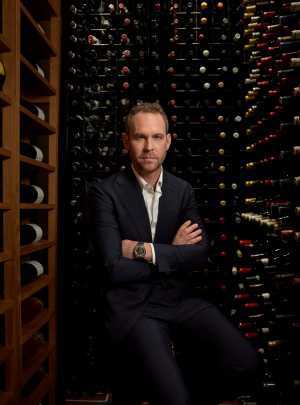With six Michelin stars to his name, Björn Frantzén is living proof of what it means to perfect your craft.
A former professional football player, Frantzén has since become one of the most respected chefs in the world.
In 2018, his eponymous restaurant became the first Swedish restaurant to be lauded with three Michelin stars – a feat he was later to replicate with Zén in Singapore in 2021.
The Swede isn’t just hot stuff in the kitchen, though. When it comes to his personal style, he’s got game. And so he makes the perfect ambassador for luxury Swedish shirt brand Eton.
We caught up with Frantzén to talk about his passion for food and fashion.

Square Mile: What’s your first memory of eating properly brilliant food?
Björn Frantzén: It was when I was 13 years old. I had a perfectly grilled sirloin with French fries, homemade mayonnaise sauce, and a tomato and red onion salad with balsamic vinegar.
SM: Sounds perfect. Did that moment influence your decision to become a chef?
BF: A hundred percent. It was an hallelujah moment – and I decided I needed to become a chef so I could learn to cook this and eat it every day for the rest of my life.
SM: So, I guess that experience shaped your approach to creating memorable dishes for others?
BF: Exactly. Exactly.
SM: What chef has had the greatest impact on your career?
BF: Alain Passard. He has a three Michelin star restaurant in Paris called L'Arpège, where I worked in my early 20s. What I learned was the lightness of cooking and making sure the star of the show is the protein in the middle of the plate, not the sauce.
SM: And that is something you’ve passed on to your own chefs in your kitchen?
BF: Yes – it forms some of my style of cooking – the lightness of it.
SM: When was the last time a dish took your breath away?
BF: Maybe it was a blueberry dessert at Noma in Copenhagen. It was served with an organic Turkish wine. It was a bizarre combination, and neither the dessert nor the wine was good on their own. But together, one plus one became three, not two. That was impressive.
SM: Did you take any elements from that pairing into your own cooking?
BF: No – that’s not my style of cooking.
SM: If you had to pick one signature dish that most represents you, what would it be and why?
BF: It would be deep-fried langoustine with dried rice and a matsutake dip. It’s finger food. But the simplicity behind it is very technical.
SM: Is it a dish that could evolve in any way, or is it something that has been mastered?
BF: Sometimes you’ve got to know when to stop. Less is more, but it’s very difficult to do.
SM: Like a custom-made shirt.
BF: Ha! Exactly
SM: As a chef, you’ve had the opportunity to collaborate across different industries. What has been the most interesting collaboration and why?
BF: I think the most similarities are definitely with the fashion industry. At the end of the day, it’s creative work, and you follow the seasons. There are a lot of similarities between fashion and food, and you can see that nowadays, with many fashion houses opening restaurants.
The collaboration with Eton, for example, is a good example of how two crafts can converge – gastronomy and bespoke tailoring – each enhancing the other, reflecting the seasons and upholding timeless quality.
SM: How does your partnership with Eton reflect your own standards in luxury and precision?
BF: Working with Eton was similar to crafting a signature dish: the details, the fit, and the personal touch. Just as I am meticulous with my own ingredients and presentation, Eton’s approach to custom-made shirts allows for a similar level of craftsmanship and personal expression.
The similarities between our crafts was exciting. Their dedication to personalisation not only complements my professional ideologies but enhances them in a way.
Beyond crafting the perfect shirt, the campaign and their collaborative approach have been spectacular, truly reflecting the quality commitment we both share.
It's been enjoyable, both personally and professionally.
Just as I am meticulous with my own ingredients and presentation, Eton’s approach to custom-made shirts allows for a similar level of craftsmanship and personal expression.
SM: Talking about collaborations, which chef would you be most excited to work on a ‘four hands menu’ with?
BF: I would love to work with Alain Ducasse. He’s a legend with a number of three-star restaurants across the globe, and he’s still a very curious person and a nice guy. I have the highest respect for him.
SM: And the location?
BF: It would be on the beach in the Maldives. I’ve never been there.
SM: And to drink?
BF: You can never go wrong with a gin and tonic. And then perhaps my own wine, called Frantzén Kolsvart. If that’s not around, I’d go for a bottle of Screaming Eagle.

SM: Which wine region or variety do you think is the most underrated and deserves more attention?
BF: I think Australian wines are really good, but people, especially sommeliers, are looking past them and prefer France. But I’d say that Australia suits my palate more, especially when it comes to value for money.
SM: You’ve cooked in many countries in your career. Which countries are still on your list and why?
BF: South America. I haven’t spent much time in any of the countries there.
SM: Is there a particular reason why?
BF: It’s the grilling techniques in Argentina. They do grilling on the ground with barbecues.
SM: How do you adapt your cooking style when you’re working with unfamiliar ingredients or in a new culinary culture?
BF: I generally don’t adapt; I try to stay true to my style.
For more on Björn Frantzén’s eye for style and the perfect custom-made shirt, check out etonshirts.com
